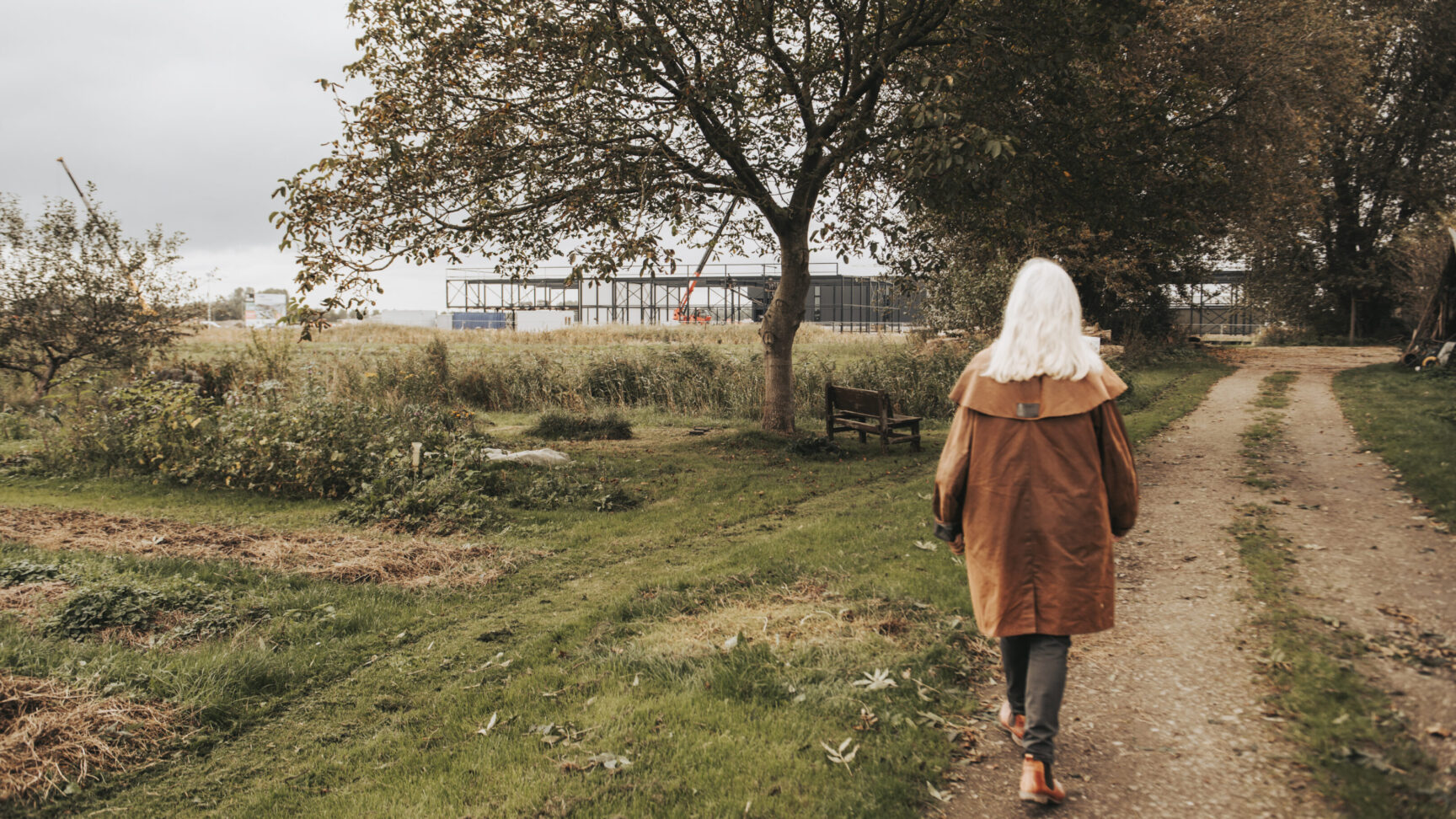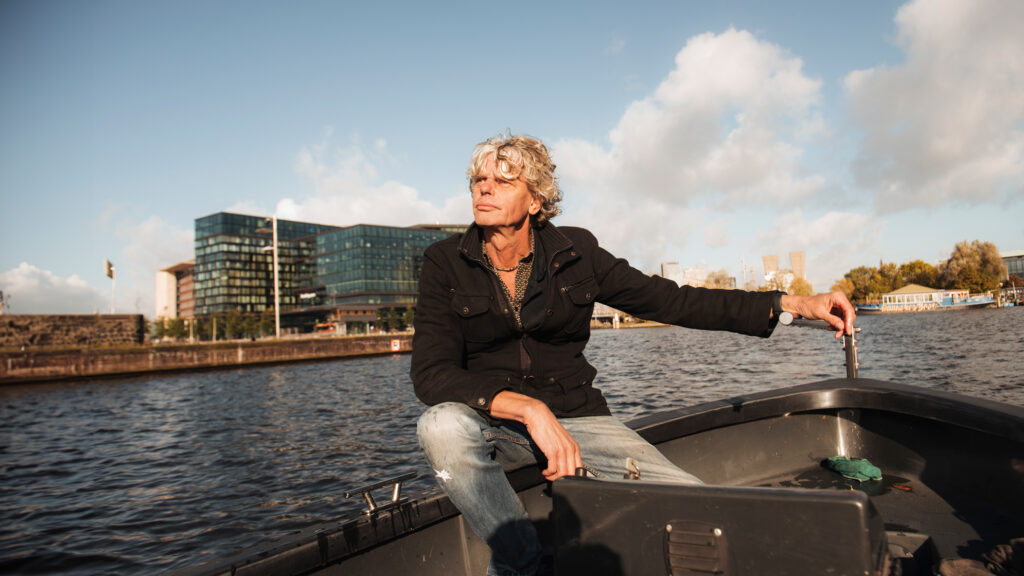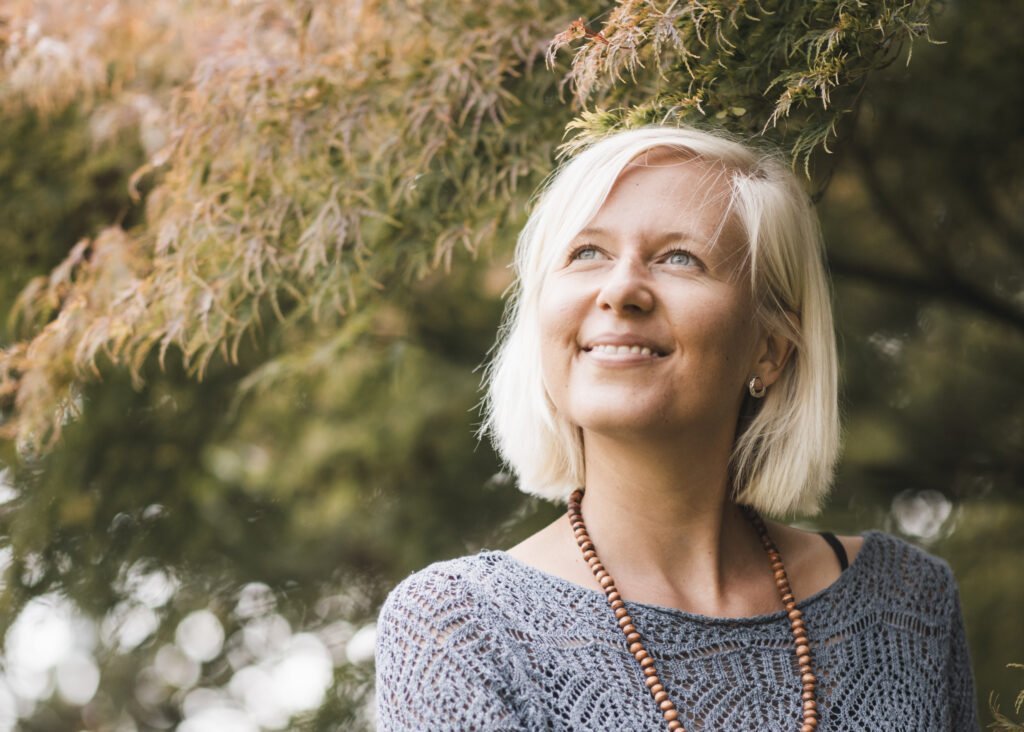Helena Norberg-Hodge: “More hands and hearts per hectare, it’s what the land needs to heal”
For over half a century, Helena Norberg-Hodge has been a leading voice in the movement towards localised economies, with a central focus on food systems. Her work calls for a reorientation – one that prioritises the true needs of people and the Earth over corporate profits. “The global economy is impoverishing us all”, she says, “even the middle classes, who are now running faster and faster, trapped in a system that is chewing up the living planet.”
What is localisation and when did you discover it’s so powerful?
“Localisation is about shifting from a global, corporate-driven system to a system that strengthens more decentralised economies, all the way down to the community level. In the modern era, there has been plenty of criticism on capitalism, but not enough focus on how economic policy favours global traders at the expense of local, regional and national economies. It was my time in Ladakh, or little Tibet, that opened my eyes to this. In the 1970s, this region in the Indian Himalayas was largely isolated, with a self-sufficient economy. But in 1975, Ladakh was suddenly opened up to the world, and with that to the global market. When I arrived, I met the happiest, healthiest, and most energetic people I’d ever known. But within a few years, so-called ‘development’ destroyed both human and ecological wellbeing – it was pulling people away from the land, erasing farms, languages and cultural diversity, along with biodiversity.
I realised what was happening in Ladakh, was happening around the world. We have been thrown into this cutthroat competition for artificially scarce jobs and resources. Before this ‘modern economy’, we never used to work as hard as we do now… We need to wake up to the fact that the only ones who benefit from the destruction of our self-reliance are global corporations.”
Uitgelichte quote
We need to realign our economy with the genuine universal needs of people
 Helena Norberg-Hodge: "All beings will benefit from building more localised systems." Photographer: Diane van der Marel
Helena Norberg-Hodge: "All beings will benefit from building more localised systems." Photographer: Diane van der Marel
 Photographer: Diane van der Marel
Photographer: Diane van der Marel
Does this mean redefining economic growth and progress?
“That’s definitely part of it. Right now, GDP is our main measure of success, but when there is more pollution, more theft, more cancer, GDP goes up… And when people in low-GDP countries like Bhutan leave the countryside, move to the city and earn only one dollar a day, it’s seen as progress. We need to realign our economy with the genuine universal needs of people. Once we do that, we will start to see a way out of many crises, including climate breakdown. Because why do we actually need so much energy? Why pump fossil fuels and plaster the land with solar panels? Once we look at that honestly, we’ll see it’s to make global corporations richer, which means making the majority poorer while destroying the real economy; the living planet.
Localisation doesn’t mean going back to a world where we cannot use energy, or where we all have to eat food from a few kilometres away. It’s about realising that all people, all beings and all ecosystems will benefit from building more localised systems.”
Uitgelichte quote
We can reduce pollution whilst simultaneously improving happiness, health, and the wellbeing of humans, animals, plants and the soil
Right now global is the norm, so where do we start?
“There is no area more important than food and farming, because farming provides something that we all need every single day. The global food system is the biggest contributor to hunger, ill health and pollution of all kinds. And yet, governments continue to separate us further and further from the source of our food. We literally send fish from Europe to China to be deboned and filleted; America exports as much beef as it imports; England imports and exports milk and butter in equal quantities. All that transport is completely unnecessary.
By shortening distances, we stimulate biodiversity, because local markets don’t want just potatoes or carrots that are all equal in size. Instead, the farmer does better by diversifying. This means that we can reduce the pollution from unnatural monocultures, which are in fact so unnatural that farmers need to use pesticides, fungicides and chemical fertilisers.
On top of that, local food systems provide meaningful work. And the remarkable fact that small diversified farms actually produce more food per hectare, more food per unit of water, means we have a magical formula. We can reduce pollution whilst simultaneously improving happiness, health, and the wellbeing of humans, animals, plants and the soil.”
Uitgelichte quote
Small diversified farms actually produce more food per hectare
 The sunflowers at local organic farm 'De Boterbloem' (Dutch for buttercup). Photographer: Diane van der Marel
The sunflowers at local organic farm 'De Boterbloem' (Dutch for buttercup). Photographer: Diane van der Marel
 Helena Norberg-Hodge: "Every living being is unique." Photographer: Diane van der Marel
Helena Norberg-Hodge: "Every living being is unique." Photographer: Diane van der Marel
You also argue that localisation is a way to stop polarisation.
“In today’s global world, we relate to each other through abstract concepts. This is what Americans are like, this is what Muslims are like, this is how nature is supposed to behave… It leads to polarised and false representations of reality. Everything that lives, every human being, every plant, every ecosystem is constantly changing, unpredictable and contradictory. That is what makes life rich. Once we come back to our local landscapes and communities, we become more aware of these complexities, more aware of the fact that things change every single day, and that every living being is unique.”
Uitgelichte quote
Global corporations constantly undermine localisation
If localisation has so many benefits, why haven’t we abandoned the global system yet?
“Because global corporations constantly undermine localisation. They do this, for example, by calling local food systems elitist. And by pretending that the only way to ‘feed the world’ is by using genetically modified seeds and selling cheap food through big supermarket chains. It’s up to us to spell out the truth and let everyone know that we don’t want our taxes to subsidise unhealthy food that is bad for the soil and bad for us, and that is only making a few giant corporations richer. We want to see those profits spread to farmers and local communities.
Whether it’s climate change, biodiversity loss, mountains of plastic, unemployment or poverty, supporting a shift in the food economy is one of the most important things we can do. Unfortunately, not enough activists at the grassroots level are talking about the bigger picture yet.”
Uitgelichte quote
The life that’s being promoted through advertising isn’t worth it. We were never meant to be running this fast
Isn’t it a bit much, to ask people to build a new local reality and also fight the global system?
“I actually think that focusing on the bigger picture can relieve some of our burden. One of the ideas pushed by big business is that we should be the change we want to see in the world. But as individuals, we are not to blame for the world we currently live in. Big business is. We were never meant to be running this fast. We were never meant to know so many people, to be bombarded with thousands of commercial messages every single day. As soon as we realise that the emissions from global trade are the real issue, we can free ourselves from the guilt. This is why we urge people to come together in small, local groups to rethink their assumptions and look at the global system. At the same time, reconnect at a deep human level, connect with nature. And be sure to do things together that you enjoy: sing, meditate, dance…”
Uitgelichte quote
Distribution centres full of stuff only serve one purpose: to make rich corporations even richer…
Can you give an example of an initiative that inspires you?
“I recently visited the Netherlands and was invited by Voedselpark Amsterdam, an area of 42 hectares in the Lutkemeerpolder. When you’re there, you can see the diversity around you, the loving care of the land, and you can see that the people who are engaged in that, really enjoy what they do. And remember, this is happening despite the fact that regulations, subsidies and politics are all working against it. In this particular case, these forces even threaten its existence. Because whilst local people are trying to create an ecological food system, the corporate economy supported by the governments is slowly taking over the land, replacing fertile soil with distribution centres full of stuff that – again – only serves one purpose: to make rich corporations even richer…”
Uitgelichte quote
Times are challenging, but when I see people connect deeply with one another and with nature, it makes me hopeful
 Local food production reconnects people to the land. Photographer: Diane van der Marel
Local food production reconnects people to the land. Photographer: Diane van der Marel
 Helena Norberg-Hodge together with the organic farmer of 'De Boterbloem' in Amsterdam. Photographer: Diane van der Marel
Helena Norberg-Hodge together with the organic farmer of 'De Boterbloem' in Amsterdam. Photographer: Diane van der Marel
It must be difficult sometimes to stay hopeful about the future.
“The good thing about localisation is that you are not only looking at the top-down, but also keeping your eye on the grassroots. Everywhere around the world, we’re seeing a huge cultural turning. People realise that the life that’s being promoted through advertising isn’t worth it. They develop an appetite for nature, for farming, for community, for coming back to life. Because they’ve seen how destructive the ‘progress path’ is, especially for young people, who spend their days on social media relating to images of life, instead of experiencing the real thing.
So, yes, times are challenging, but when I see people connect deeply with one another and with nature, it makes me hopeful. Because it’s during these moments that we discover a deep spiritual homecoming; we suddenly feel more expanded, more relaxed, and part of something that’s bigger than ourselves, which makes us feel more confident, more secure. We no longer have to compete to prove ourselves and be important in order to feel appreciated or loved.”
Uitgelichte quote
We need to care for every little earthworm, every apple tree, every bit of water, and create a culture in which that care is celebrated

Your first book was called Ancient Futures, your second Local is Our Future. What will be your next focus?
“Feminine Futures is an event I recently organised in England and it will probably be the title of my next book. In ancient, land-based cultures, the structures were localised and both men and women engaged in care, nurturing and love – a feminine way of caring for the children, caring for the elderly, caring for themselves. There were more hands, more eyes, more hearts per hectare: it’s what the land needs to heal. It’s what the people need to heal. We need to care for every little earthworm, every apple tree, every bit of water, and create a culture in which that care is celebrated.”
Original publication date: 30th of October 2024. Last update: 12th of January 2026.
Who is Helena Norberg-Hodge?
Helena Norberg-Hodge (1946) is the founder and director of Local Futures, a non-profit dedicated to supporting local communities, food systems and economies. In 1991, Helena wrote the international bestseller Ancient Futures, about tradition and change in the Himalayan region of Ladakh. Her second book Local is Our Future (2019) lays out an alternative to the global economy. In 2011, Helena produced and co-directed the award-winning documentary The Economics of Happiness and recently she initiated World Localization Day. For her pioneering work, she has been awarded the Right Livelihood Award (1986) and the Goi Peace Award (2012).



